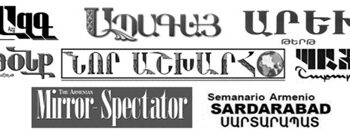By Dr. Arshavir Gundjian, C.M.
Special to the Mirror-Spectator and Abaka
It is time for Artsakh and Armenians around the world to wake up and realize that somehow the Lachin blockade has made us unable to see the forest for the trees. The avalanche of catastrophic developments since the end of the 44-day Artsakh war in 2020 seems to have caused Armenians to almost forget that the core issue about Artsakh, ever since the historic start of the Artsakh movement in 1988, is its outright independence, certainly not just the maintenance of an open Lachin corridor to the Republic of Armenia.
It seems to be forgotten that Artsakh on December 10, 1991 carried out all the internationally prescribed steps of that time, and based on the overwhelmingly positive results of a referendum, declared its legal independence as the Republic of Mountainous Karabakh (Artsakh).
The fact that in the mumbo jumbo of all the deliberations of the Madrid, Minsk and various other so-called negotiations following the 1994 ceasefire of the first Artsakh war, the Armenian side has allowed this crucially important fact to be forgotten has yet to be properly analyzed by historians, who no doubt will harshly blame the Armenian negotiators,.
At this point, however, rather than try to revive and reclaim the validity of the December 10, 1991 historic referendum, Armenians must realize that Artsakh is being offered spontaneously, and surely inadvertently, a new path that allows it to claim its independence with the equally strong backing of international law and precedents. Consequently, they must act now forcefully and without hesitation or delay.
Paradoxically, we may even thank Aliev for having paved the way and provided all the legal and humanitarian arguments that establish the solid legal grounds for Armenians in Armenia and Artsakh to confidently present their case today for the outright independence of Artsakh to the International Court of Justice.
As we know, at this point, Armenia has already presented to the International Court its case only for the opening of the Lachin corridor. I submit that while the latter has certainly merit in order to resolve at least temporarily the immediate humanitarian crisis of 120,000 Armenians who are suffering the increasingly life-threatening consequences of the blockade, there is the much larger and far-reaching fundamental issue of the right of Artsakh to independence at stake, which finds now suddenly a realistic path towards realization.
The Kosovo independence case, backed and endorsed by the International Court ruling in July 2010, which has been invoked by many already several times as a precedent for Artsakh, has become now a salient precedent.
The major obstacle so far to Artsakh has been the claim by Azerbaijan to its internationally protected right for territorial integrity and its hypocritical claim that Artsakh and its Armenian population can very well live and prosper within Azerbaijan as citizens of that country. Let us put to one side the well documented tragic stories of the 1980s Sumgait Armenian pogroms in Azerbaijan. The ongoing brutal behavior of Azerbaijan’s President Ilham Aliyev during the 50+ days of the current Artsakh blockade, in addition to the open implementation in Azerbaijan of his racist policy of hatred towards Armenians, offer unexpected help for, and make solidly defensible in the International Court, the case for the Artsakh population’s claim that living a tolerable free human life within Azerbaijan is for them an unquestionable impossibility.
This establishes an almost perfect parallel between the case of Kosovo, which declared independence from Serbia unilaterally in February 2008, and the Artsakh case today.
Thus, it should be an urgent priority for Artsakh, while still pursuing all the processes to secure the opening of the Lachin corridor, to mobilize immediately the best of its human and legal resources to create a very high-profile task force that prepares and undertakes the official recourse to the UN’s International Court of Justice and submits an official demand for a ruling on Artsakh’s right for independence. The presence of Minister of State Ruben Vardanyan at the head of the Artsakh government is certainly expected to be an asset at this critical juncture.
This obviously daring diplomatic move should have been taken already at some point within the 30 years since the first Artsakh war ceasefire in 1994. Instead, the hesitancy and the total lack of any well thought out even though somewhat tricky but well-structured, Armenian diplomatic strategy has instead led Artsakh and Armenia to the current diplomatic trap.
A blunt and courageous, yet well programmed daring move is now the only way out of this hole!
We expect the Republic of Armenia to be the first country to back officially this vital Artsakh demand, and to facilitate Artsakh’s demand of the International Court of Justice. We also expect logically all the countries which have backed Kosovo in 2010 to follow suit today in favor of Artsakh. Finally, the most talented Armenian diasporan experts in this field are certainly expected to offer their unreserved services for Artsakh to achieve finally for its population the right to live an honorable life and prosper freely within the family of all 195 other free nations of our planet.
In my view this proposed action for Artsakh to declare its independence is now a national emergency.





